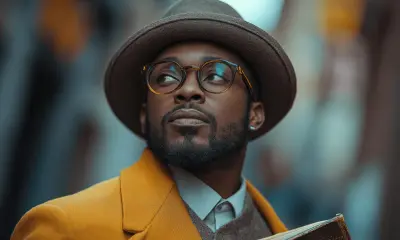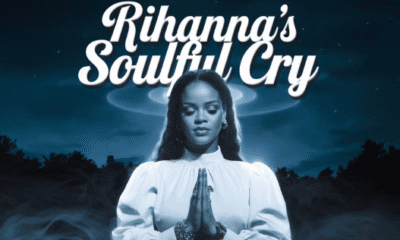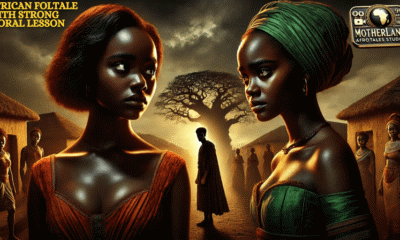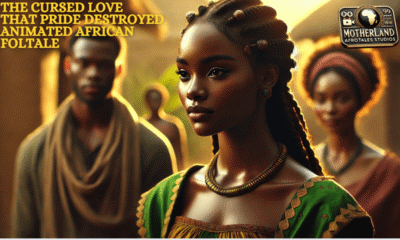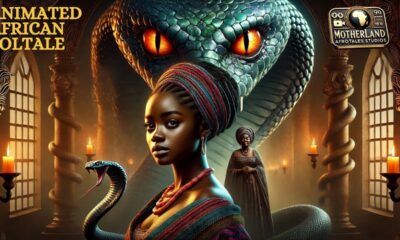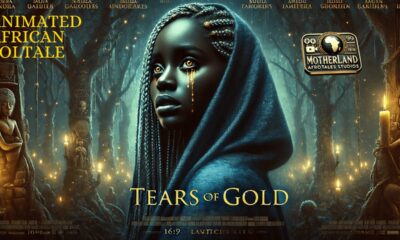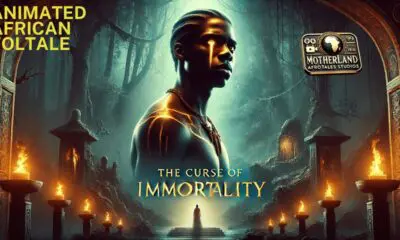Entertainment News
Top 10 Veteran Nigerian Musicians Whose Children Are Into Music
By Adedayo Odulaja and Ghaniyah Olowoyo, Saturday Telegraph
General Kollignton Ayinla & Queen Salawa Abeni
Son: Big Sheff
General Kollington Ayinla remains a colossus in the annals of Nigerian music while the stock of the irrepressible Queen Salawa Abeni is equally monstrous. And so it would be unforgivable to beam the searchlight on the child of these two legends who is into music.
Sheriff Ilori, who is better known as Big Sheff, is one of the two children produced by the union between Kollington and Salawa which ended in animosity. After years of having nothing to do with each other, the Ijo Oyoyo exponent, General Kollington Ayinla and Queen Abeni Salawa, the Waka Queen, were forced to bury the hatchet and come together for the visuals of Gentle Lady (remix), featuring his mother, the Waka queen and General Kollington Ayinla, his father.
Big Sheff, who has been referred to as Nigeria’s Rick Ross on account of his similar look with the American rapper and shape, has a few songs to his credit and remains very confident of the future.
K 1 The Ultimate
In terms of influence, not one or two but three of the children of legendary Fuji legend, K1 The Ultimate, has been inspired to follow in the footsteps of their father, with Musty, Sultan and Zainab all embracing music. Although they all live outside the shores of Nigeria, Musty lives in Canada, Sultan in Chicago and Zainab a.k.a Honey B in the UK. They all released their debut singles in 2012.
In June 2012, Musty, while a student at York University in Toronto, dropped his pop-themed single titled “Dance”. This was after releasing his first body of works titled Fine Works of Spring and The King’s Legacy. On his own, Sultan dropped his own debut single, “Talazo Reloaded” with his father K1, with the fast-paced club sound being a remix of his father’s hit song, “Talazo” while Honey B, who graduated from The BRIT School of Performing Arts in Croydon where she studied Music, has singles such as Sempe in which she featured her father.
Honey B took to the stage along with her father during his show, K1 Live Unusual in 2014, after releasing her music video, “Up Down” back in 2013.
Ebenezer Obey-Fabiyi
Son: Tolu Obey
Daughter: Orejaiyeola
When Chief Commander Ebenezer Obey decided to focus less on music but more winning souls for God in his later years, not many would have thought his successors would spring up so soon. That is exactly what has played out as the Juju legend’s son, Tolu and daughter, Orejaiyeola, have indicated readiness to step into the ring. While Tolu has decided to walk the exact path chosen by his father many years ago with Juju, his sister prefers Christian gospel music and according to sources, has an album in the market already.
With the emergence of his son Tolu into the music scene, many soon became convinced that if there was a person likely to take over from him then it would be the grey-haired man and Tolu runs the show as far as the Miliki brand of music is concerned. But although he is a good music artiste in his own right, the albatross, as is the case for most whose fathers walked the same path ahead of them, standards set too high.
King Sunny Ade
Son: Sunny Aadegeye Junior
Ace juju musician, Sunday Adeniyi Adegeye, a.k.a King Sunny Ade, is easily one of the most influential entertainers in Nigeria and among those that have successfully exported the rich content of contemporary Nigerian music to the rest of the world. With the passion of KSA, considered to be one of the best in the history of music in Nigeria, for music inherited from his father, who was an organist, it is not so surprising that Sunny Adegeye Junior, the son of the juju legend, has taken after him also. The young man released his maiden CD featuring a single song titled “Samba” years back while he was an undergraduate of Sociology at the University of Lagos.
Art Alade and son
Darey Art Alade
Modupe Afolabi Jemi-Alade was popularly known as Art Alade in his days. A Nigerian television personality and producer who hosted The Bar Beach Show, a weekly variety show on NBC-TV back in the 1970s, he embarked on a career in music after his retirement and it must be said that the latter career mainly defined his role on earth.
Apart from establishing a club known as Art’s Place where he performed regularly, he became a Jazz pioneer in Nigeria. That legacy has been boosted further by the talent and vision of his son, Dare Art Alade. A Nigerian musician, singer, songwriter and judge on reality TV show, Idol, Darey honed his skills at an early age, singing with several choirs, including the National Troupe of Nigeria Choir as well as the Cathedral Choir.
Determined to not just to follow in his father’s footsteps but eager to forge his own legacy, he started out at 15, performing extensively in clubs around Lagos, Ibadan and other Nigerian cities. His big break was to come in 2004 as he emerged Second Runner-up at Project Fame Academy, a well renowned Reality TV show and continent-wide talent hunt. Since the last decade, he has been a disc jockey, TV presenter, entertainment consultant, voice-over artist and performing/recording artist with four albums, From Me 2 U, unDAREYted, DoubleDare and Naked along with a line-up of hits including the unforgettable “Escalade”, “Not The Girl” and “Pray For Me”.
Orlando Owoh
Sons: Daisi, Kunle Orlando Owoh and Donald Orimipe Owoh
Born Stephen Oladipupo Owomoyela, Orlando Owoh was a force of talent as a highlife musician and band leader. Later known as Chief Dr. Orlando Owoh by fans and admirers, Owoh turned to music in 1958 after he was hired by the popular Kola Ogunmola Theatre Group to play drums and sing. Forming the Dr. Orlando Owoh and his Omimah Band in 1960, he led a career that lasted over forty years as the Omimah Band went through evolution to become the Young Kenneries and then African Kenneries International. Owoh, who remained monstrously popular until his death 10 years ago, is believed to have over 45 albums to his credit.
Through based in the US, Donald Orimipe Owoh decided to follow his legendary father’s footstep by becoming a musician, becoming the third to embrace music after his brother, Daisi and the better known Kunle Orlando Owoh, who had earlier taken the plunge.
Donald Orimipe Owoh recorded an album, Tribute To My Father, in America with the 5-track album boasting of songs like Kennery Transformation, Jesus, Oju Owagho (Dedication) and Omoolode (American Boyz).
IK Dairo
Son: Paul IK Dairo
Late Isaiah Kehinde Dairo was a notable Nigerian Jùjú musician whose career grew in leaps and bounds when he founded a ten-piece band called the Morning Star Orchestra in 1957. In the early 1960s, he changed the band’s name to Blue Spots and later won a competition televised in Western Nigeria to showcase the various talents in Jùjú music. During the period, he was able to form his own record label in collaboration with Haruna Ishola, both going on to achieve critical acclaim and unlimited fame, with Dairo going on to tour parts of Europe and North America in the 1970s and 1980s.
His son, Paul Babatunde Dairo, also known as Paul IK Dairo or Paul Play, emerged on the Nigerian music scene in the late 90s through 2000s as one of the pioneers of the pop wave gaining ground during the period along with the likes of Remedies, Trybesmen and Plantashun Boiz. A producer, songwriter and singer, Paul Play distinguished himself as one of the most versatile musicians around with his ability to blend hip-hop tunes of the moment with the traditional Nigerian High life tunes of his father’s era. Paul, who started as a producer, songwriter and back-up vocalist before hitting the limelight, is mostly remembered for singles like “Mosorire”, a remix of one of his father’s hits as well as the gripping “Angel of My Life” among others.
Sikiru Ayinde Barrister
Son: Barry Showkey
Daughter: Barrymade
Sikiru Ololade Ayinde Balogun, MFR, better known by his stage name, Ayinde Barrister, was a legendary Nigerian singer-songwriter and performer. He is repurted with pioneering what is today known as Fuji music from its Wéré origins. After his first break into music in 1965, Ayinde Barrister released over 70 studio albums before he died in December, 2010 having kick-started his music career at a young age as an Ajiwere singer during the period of Ramadan. In between, he worked as a typist for Nigerian Breweries and was later enlisted as a clerk in the Nigerian Army during the Nigeria Civil War. He left the army to become a full-time musician and proceeded to start a full-fledged band of 34 percussionists and vocalists called the “Supreme Fuji Commanders”.
Two of his children began experimenting with music while he was alive. Tpday, Modinat Ayeloja, aka Barrymade, already has four albums to her credit while Barry Showkey was signed to the biggest Nigerian music label, Kennis Music, at a time, releasing an album titled Fuji Hip Hop in the process including a well-received song titled “Ori mi gbe mi” along with a music video.
Fela Anikulapo-Kuti
Sons: Femi Anikulapo-Kuti, Oluseun Anikulapo-Kuti
Grandson: Omorinmade Kuti
Despite his death back in 1997, everyone knew it was going to be very difficult for fans, sympathisers, followers and Nigerians in general, to forget the composer, multi-instrumentalist, musician, activist and iconoclast that Fela Anikulapo Kuti was. Fela, who founded the Afrobeat music genre and became a thorn in the flesh of everyone that had anything to do with government, is Africa’s most respected music legend. Known to play music with saxophone, vocals, keyboards, trumpet, guitar, drums among others, the call-and-response within the chorus as well as the figurative but simple lyrics remain some of the characteristics in Fela’s music.
Fela’s eldest son, Olufemi Anikulapo Kuti is also a songwriter and a musician who started music since 1978, playing the same instruments as his father. Even though, he started off with his father’s band, Femi started his own band, the Positive Force Band and began establishing himself as an artist independent off his father’s massive legacy back in the 80s. So eager and good was Femi that he recorded “Wonder Wonder”, easily one of the best songs of his career, back then and continues to power on.
Oluseun Anikulapo Kuti, commonly known as Seun Kuti, is another son of the legendary Fela Anikulapo Kuti who is a musician. Being the youngest son of the iconic Afrobeat pioneer, Seun leads his father’s former Egypt 80 Band currently but started performing with his father at the age of nine. When his father died in 1997 and with Femi already in charge of his own band, he took over as the lead singer of Egypt 80 even though he was only fourteen then. He apparently has done a good job of it even if he is not a commercially successful act as viewed from the prism of today’s industry dynamics, so much so that he recently earned his first Grammys nomination.
Not only did Femi inherit music from his father; he has seemingly taken on the garment of political activism well in recent years, especially. And he has continued with nurturing the legacy as his first son, Made Kuti, a graduate of Trinity Laban Conservatoire of Music and Dance, London, has also joined in the family heritage and now plays alongside his father in the Afrika Shrine.
Haruna Ishola’
Son: Musiliu Haruna Ishola
A legendary Nigerian musician by all standards, Haruna Ishola Bello, MON was one of the most popular artistes in the Nigerian music terrain pre-Independence in 1960.
Ishola, who lived between 1919 and 1983, was born in Ijebu-Igbo and his relentless touring gave him a reputation as the most in-demand entertainer for parties among the wealthy Nigerian elite. In 1955, a reworked version of his 1948 album was released following the death of Oba Adeboye, the Orimolusi of Ijebu Igbo, leading to an upsurge for him in terms of fame and fortune. Following his decision to begin recording Apala songs around 1955, he became the most popular artist in the genre.
In 1969, Ishola started STAR Records Ltd., in partnership with Juju music legend, I.K. Dairo and it became the first African record label owned by its own artists and Ishola became one of the first Nigerian musicians to tour abroad, performing in Benin, the United Kingdom, Sweden, France, West Germany, and Italy before his death in 1983.
His son, Musiliu Haruna Ishola, who said he joined his father’s band as far back as 1975 as a back-up singer, became the rave of the moment upon releasing the album, Soyoyo in 2000. So big was the album that the younger Haruna Ishola who had become a big star on the performance circuit for much more than a decade before releasing the album, toured parts of UK, United States of America, Canada as well as countries in Europe.




























